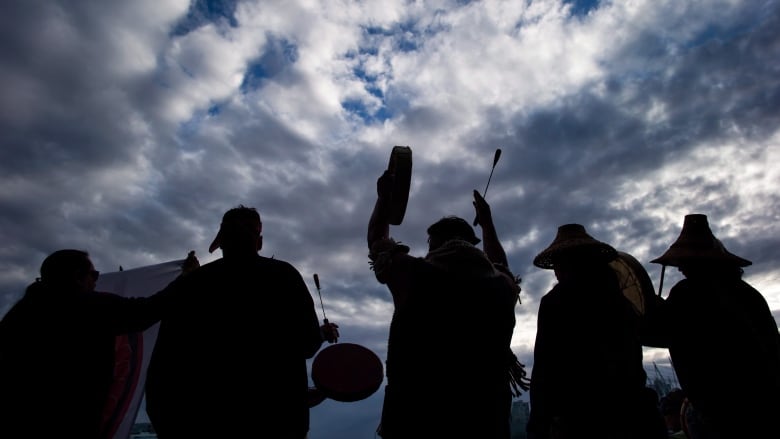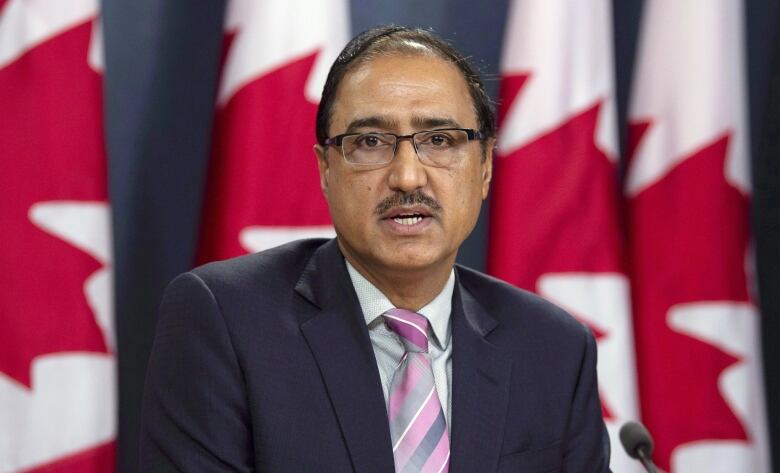Ottawa in a 'strong position' to finish Indigenous consultation on Trans Mountain in 90 days: Sohi

Natural Resources Minister Amarjeet Sohisaid today Indigenous consultationefforts on the Trans Mountain expansion project are expected to wrap up within 90 days, paving the way for a new cabinet decision on the project by summer.
Speaking to reporters after attending an energy summit in Houston, Sohi said the Crown consultation teams the people carrying out the government's constitutional obligation to meet withIndigenous groups affected by the projectbefore giving it a green light are in a "strong position" to finish their work aftermonths of meetings with First Nations and Mtis groups in Alberta and B.C.
Sohi said that, so far, the teams have met with over 100 different Indigenous communities.
"The consultation is proceeding as we had planned. Based on the work we've done so far, and the work we will continue to do overthe next few months, I feel that we are in a strong position to conclude these consultations, ensuring we have adequately fulfilled our obligation for meaningful consultations over the next 90 days," Sohi said.

Sohi has been reluctant before now to impose a strict timeline on the consultations, sayingOttawa is willing to give these teams all the timethey need to carry out the court-mandated work.
Now, oilpatch boosters have a cleareridea of when the years-long approval process could finally come to an end.
When asked if the consultations have had any effect on the prominent project opponents among Indigenous groups, Sohi said consultants have a clear idea of the pressing issues specifically the risk of a spill in a marine environment.
He said Ottawa is open to "accommodationswhere possible" to satisfy Indigenous concerns about the cultural and environmental impactof nearly tripling the capacityof the existing Trans Mountain pipeline.
Planned work on the new pipelinewas stalledlast summer after the Federal Court of Appealnullified licensing for the $7.4 billion expansion, quashed cabinet's initial approval and halted further work ordering Ottawa back to the consultation table with Indigenous peoples.
The court said past consultants were glorified note-takers who documented Indigenous concerns but did little to recommend changes that mightsatisfy Indigenous concerns.
When asked about those criticisms, Sohi said Ottawa is addressing "deficiencies" in the consultation process.The federal governmenthas more than doubled the number of consultants working on these efforts. There are now 60 individuals on eight different teams who have fanned out to meet face-to-facewith affected communities along the project's route.
"All of these teams have the proper mandate to actually engage and offer accommodation. They did not have that mandate in the last round. They're properly trained and we have external expertise on the team," Sohi said, citing the government's move to hire former Supreme Court justice Frank Iacobucci as a constitutional arbiter.
The Edmonton-area minister said the Crown consultants have been "empowered ... to engage in a two-way dialogue and offer accommodations."
The court also demanded that Ottawa task the National Energy Board (NEB) with considering the impact that the expansion, and increased tanker traffic near the terminal in Burnaby, B.C., would have on local marine life notably the Southern resident killer whale population.
The NEB completed that work last month and recommended that cabinet approve the project, clearing another major hurdle standing in the way of Ottawa approving the multi-billion-dollar project it bought last year.
Theregulator also imposed156 conditions on the project (it listed 157 conditions when it first approved the project in May 2016), while also handing Ottawa 16 new non-binding recommendations it said would help mitigate marine safety risks.
The1,150-kilometre expansion project would boost the pipeline's capacity to roughly890,000 barrels a day. It would allow Alberta's oilpatchto transport much more product to coastal B.C., where it would then be shipped tomarkets in Asia.
With the completion of the expansion,crude oil-carryingtanker traffic from theWestridge Marine Terminalcouldincrease from aboutthreevessels a month to one a day.
With their pipeline capacity severely constrained, Canada's oil producershave long demanded anew pipeline to tidewater that would allow Canadian producers to fetch prices closer to the going world rate for oil which could in turn boost government revenue.
Corrections
- This story has been updated from a previous version that stated that tanker traffic from the Westridge Marine Terminal, before the Trans Mountain Expansion project comes online, is about five vessels a month. In fact, data from the Port of Vancouver shows between 2015 to 2020, there has been a monthly average of three crude oil tankers visiting Westridge Marine Terminal.Dec 16, 2020 12:59 PM ET












_(720p).jpg)


 OFFICIAL HD MUSIC VIDEO.jpg)
.jpg)



























































































